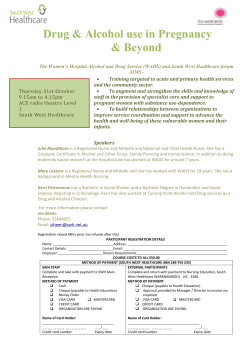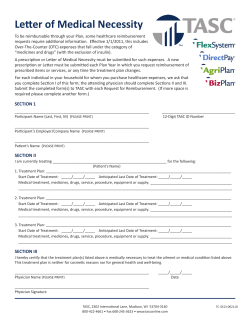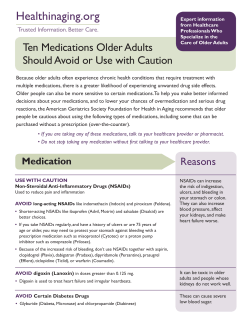
MEDICATION GUIDE VIMOVO (vi-moh-voh) (naproxen and esomeprazole magnesium)
MEDICATION GUIDE VIMOVO® (vi-moh-voh) (naproxen and esomeprazole magnesium) delayed release tablets Read this Medication Guide before you start taking VIMOVO and each time you get a refill. There may be new information. This information does not take the place of talking with your healthcare provider about your medical condition or your treatment. What is the most important information I should know about VIMOVO? VIMOVO, which contains naproxen [a nonsteroidal anti-inflammatory drug (NSAID)] and esomeprazole magnesium, may increase the chance of a heart attack or stroke that can lead to death. This chance increases: • with longer use of NSAID medicines • in people who have heart disease NSAID-containing medicines, such as VIMOVO, should never be used right before or after a heart surgery called a coronary artery bypass graft (CABG). NSAID-containing medicines, such as VIMOVO, can cause ulcers and bleeding in the stomach and intestines at any time during treatment. Ulcers and bleeding: • can happen without warning symptoms • may cause death The chance of a person getting an ulcer or bleeding increases with: • taking medicines called steroid hormones (corticosteroids) and blood thinners (anticoagulants) • longer use • smoking • drinking alcohol • older age • having poor health NSAID medicines should only be used: • exactly as prescribed • at the lowest dose possible for your treatment • for the shortest time needed What are Non-Steroidal Anti-Inflammatory Drugs (NSAIDs)? NSAID medicines are used to treat pain and redness, swelling, and heat (inflammation) from medical conditions such as: • different types of arthritis • menstrual cramps and other types of short-term pain Who should not take a Non–Steroidal Anti–Inflammatory Drug (NSAID)? Do not take an NSAID medicine: 35 Reference ID: 3478592 • if you had an asthma attack, hives, or other allergic reaction with aspirin or any other NSAID medicine • for pain right before or after heart bypass surgery Tell your healthcare provider: • about all of your medical conditions • about all of the medicines you take. NSAIDs and some other medicines can interact with each other and cause serious side effects. Keep a list of your medicines to show to your healthcare provider and pharmacist. • if you are pregnant. NSAID medicines should not be used past 30 weeks of pregnancy. • if you are breastfeeding. Talk to your healthcare provider. What are the possible side effects of Non–Steroidal Anti– Inflammatory Drugs (NSAIDs)? Serious side effects include: heart attack stroke high blood pressure heart failure from body swelling (fluid retention) kidney problems including kidney failure bleeding and ulcers in the stomach and intestine low red blood cells (anemia) life-threatening skin reactions life-threatening allergic reactions liver problems including liver failure asthma attacks in people who have asthma Other side effects include: stomach pain constipation diarrhea gas heartburn nausea vomiting dizziness Get emergency help right away if you have any of the following symptoms: • shortness of breath or • slurred speech trouble breathing • swelling of the face or • chest pain throat • weakness in one part or side of your body Stop your NSAID medicine and call your healthcare provider right away if you have any of the following symptoms: • nausea • more tired or weaker • there is blood in your than usual bowel movement or it is • itching black and sticky like tar • your skin or eyes look • skin rash or blisters with yellow fever • stomach pain • unusual weight gain • flu-like symptoms • swelling of the arms and • vomit blood legs, hands and feet 36 Reference ID: 3478592 These are not all of the possible side effects with NSAID medicines. Talk to your healthcare provider or pharmacist for more information about NSAID medicines. Call your doctor for medical advice about side effects. You may report side effects to FDA at 1-800-FDA-1088. Other information about Non–Steroidal Anti–Inflammatory Drugs (NSAIDs) • Aspirin is an NSAID medicine but it does not increase the chance of a heart attack. Aspirin can cause bleeding in the brain, stomach, and intestines. Aspirin can also cause ulcers in the stomach and intestines. • Some of these NSAID medicines are sold in lower doses without a prescription (over-the-counter). Talk to your healthcare provider before using over-the-counter NSAIDs for more than 10 days. NSAID medicines that need a prescription Generic Name Celecoxib Diclofenac Diflunisal Etodolac Fenoprofen Flurbiprofen Ibuprofen Indomethacin Ketoprofen Ketorolac Mefenamic Acid Meloxicam Nabumetone Naproxen Oxaprozin Piroxicam Sulindac Tolmetin TRADENAME Celebrex Zorvolex, Cataflam, Cambia, Voltaren, Voltaren gel, Arthrotec (combined with misoprostol), Flector, Zipsor, Pennsaid Dolobid Lodine, Lodine XL Nalfon, Nalfon 200 Ansaid Motrin, Tab-Profen, Vicoprofen* (combined with hydrocodone), Combunox (combined with oxycodone), DUEXIS (combined with famotidine) Tivorbex, Indocin, Indocin SR, Indo-Lemmon, Indomethagan Oruvail, Nexcede Toradol, Sprix Ponstel Mobic Relafen Naprosyn, Anaprox, Anaprox DS, EC-Naprosyn, Naprelan, Naprapac (copackaged with lansoprazole), Treximet (combined with sumatriptan succinate), VIMOVO (combined with esomeprazole magnesium) Daypro Feldene Clinoril Tolectin, Tolectin DS, Tolectin 600 * Vicoprofen contains the same dose of ibuprofen as over-the-counter (OTC) NSAIDs, and is usually used for less than 10 days to treat pain. The OTC NSAID label warns that long-term continuous use may increase the risk of heart attack or stroke. What other important information should I know about VIMOVO? 37 Reference ID: 3478592 VIMOVO may help your acid-related symptoms, but you could still have serious stomach problems. Talk with your healthcare provider. VIMOVO can cause other serious side effects, including: • Diarrhea. VIMOVO may increase your risk of getting severe diarrhea. This diarrhea may be caused by an infection (Clostridium difficile) in your intestines. Call your healthcare provider right away if you have watery stool, stomach pain, and fever that does not go away. • Bone fractures. People who take multiple daily doses of proton pump inhibitor medicines for a long period of time (a year or longer) may have an increased risk of fractures of the hip, wrist, or spine. You should take VIMOVO exactly as prescribed, at the lowest dose possible for your treatment and for the shortest time needed. Talk to your healthcare provider about your risk of bone fracture if you take VIMOVO. VIMOVO can have other serious side effects. See “What is the most important information I should know about VIMOVO?” and “What are the possible side effects of VIMOVO?” What is VIMOVO? VIMOVO contains 2 medicines: naproxen, a non-steroidal anti-inflammatory drug (NSAID) and esomeprazole magnesium, a proton pump inhibitor (PPI). VIMOVO is a prescription medicine used to: • relieve signs and symptoms of osteoarthritis, rheumatoid arthritis, and ankylosing spondylitis • decrease the risk of developing stomach (gastric) ulcers in people who are at risk of developing gastric ulcers with NSAIDs It is not known if VIMOVO is safe or effective in children under the age of 18. Who should not take VIMOVO? Do not take VIMOVO: • If you had an asthma attack, hives, or other allergic reaction after taking aspirin or other NSAID medicine. • If you are allergic to any of the ingredients in VIMOVO. See the end of this Medication Guide for a complete list of ingredients in VIMOVO. • If you are allergic to any other Proton Pump Inhibitor (PPI) medicine. • For pain right before or after heart bypass surgery What should I tell my healthcare provider before taking VIMOVO? Before you take VIMOVO, tell your healthcare provider about all your medical conditions, including if you: • have been told that you have low magnesium levels in your blood • have liver or kidney problems • have ulcerative colitis or Crohn’s disease (inflammatory bowel disease or IBD) • have any other medical conditions • are pregnant or plan to become pregnant. See “What is the most important information I should know about VIMOVO?” • are breastfeeding or plan to breastfeed. VIMOVO may pass into your breast milk. Talk to your healthcare provider about the best way to feed your baby if you take VIMOVO. 38 Reference ID: 3478592 Tell your healthcare provider about all the medicines you take, including prescription and non-prescription medicines, vitamins, and herbal supplements. Since VIMOVO contains naproxen, talk to your healthcare provider before taking any other NSAID-containing products. Taking VIMOVO with other medicines can cause serious side effects. VIMOVO may affect the way other medicines work, and other medicines may affect how VIMOVO works. Especially tell your healthcare provider if you take: • • • • • • • • • • • • • • • • • • steroid hormones (corticosteroids) St. John’s Wort rifampin (Rifater, Rifamate, Rimactane, Rifadin) a medicine for high blood pressure or heart problems aspirin cholestyramine (Questran, Questran Light, Locholest, Locholest Light, Prevalite) cyclosporine (Gengraf, Neoral, Sandimmune) or tacrolimus (Prograf) a water pill (diuretic) lithium carbonate methotrexate a blood thinner medicine an antidepressant medicine atazanavir (Reyataz) ketoconazole (Nizoral) products that contain iron digoxin (Lanoxin) erlotinib (Tarceva) clopidogrel (Plavix) Ask your healthcare provider or pharmacist for a list of these medicines if you are not sure. Know the medicines you take. Keep a list of them to show your healthcare provider or pharmacist when you get a new medicine. How should I take VIMOVO? • Take VIMOVO exactly as your healthcare provider tells you to take it. • Your healthcare provider may tell you to take Vitamin D and Calcium supplements during treatment with VIMOVO. • Your healthcare provider will tell you how many VIMOVO to take and when to take them. • Do not change your dose or stop VIMOVO without first talking to your healthcare provider. • Take VIMOVO at least 30 minutes before a meal. • Swallow VIMOVO tablets whole with liquid. Do not split, chew, crush or dissolve the VIMOVO tablet. Tell your healthcare provider if you cannot swallow the tablet whole. You may need a different medicine. • You may use antacids while taking VIMOVO. • If you forget to take a dose of VIMOVO, take it as soon as you remember. If it is almost time for your next dose, do not take the 39 Reference ID: 3478592 missed dose. Take the next dose on time. Do not take 2 doses at one time to make up for a missed dose. • If you take too much VIMOVO, tell your healthcare provider or go to the closest hospital emergency room right away. Symptoms that you have taken too much VIMOVO may include: • feeling weak and tired • dizziness • vomiting • feeling sleepy • bleeding • upper stomach-area • movements of a body pain or discomfort part that you cannot • heartburn, control indigestion, or nausea • coordination problems • a change in breathing and decreased movement or you stop breathing • Your healthcare provider may do certain tests from time to time to check you for side effect of VIMOVO. What should I avoid while taking VIMOVO? VIMOVO can cause drowsiness, dizziness, or depression. You should not drive or do other activities that require you to be alert until you know how VIMOVO affects you. What are the possible side effects of VIMOVO? VIMOVO may cause serious side effects, including: • See “What is the most important information I should know about VIMOVO?” • High blood pressure. • Heart problems such as congestive heart failure. Tell your healthcare provider about any swelling of your body, hands or feet, sudden weight gain or trouble breathing. • Active bleeding. Tell your healthcare provider if you have signs of active bleeding including: • passing black sticky bowel movements (stools) • having bloody diarrhea • vomiting or coughing up blood or dark particles that look like coffee grounds • Serious allergic reactions. Tell your healthcare provider or get medical help right away if you develop sudden wheezing, swelling of your lips, tongue, throat or body, rash, fainting or problems breathing or swallowing (severe allergic reaction). • Serious skin reactions. Tell your healthcare provider or get medical help right away if you develop: • reddening of your skin with blisters or peeling • blisters and bleeding of your lips, eye lids, mouth, nose, and genitals. • Liver problems. Tell your healthcare provider if you develop: 40 Reference ID: 3478592 • • • • • • yellowing of the skin or the whites of your eyes dark urine feel tired nausea right upper stomach area (abdominal) pain flu-like symptoms • Chronic (lasting a long time) inflammation of the stomach lining (Atrophic Gastritis). Using VIMOVO for a long period of time may increase the risk of inflammation to your stomach lining. You may or may not have symptoms. Tell your healthcare provider if you have stomach pain, nausea, vomiting, or weight loss. • Low magnesium levels in your body. Low magnesium can happen in some people who take a proton pump inhibitor medicine for at least 3 months. If low magnesium levels happen, it is usually after a year of treatment. You may or may not have symptoms of low magnesium. Tell your healthcare provider right away if you have any of these symptoms: o o o o o o o o o seizures dizziness abnormal or fast heart beat jitteriness jerking movements or shaking (tremors) muscle weakness spasms of the hands and feet cramps or muscle aches spasm of the voice box Your healthcare provider may check the level of magnesium in your body before you start taking VIMOVO, during treatment, or if you will be taking VIMOVO for a long period of time. The most common side effects of VIMOVO include: • inflammation of the lining of the stomach, with or without loss of the protective layer of the stomach (erosive gastritis) • indigestion • diarrhea • stomach ulcers • upper stomach-area (abdominal) pain • nausea Tell your healthcare provider if you have any side effect that bothers you or that does not go away. These are not all the possible side effects of VIMOVO. For more information, ask your healthcare provider or pharmacist. 41 Reference ID: 3478592 Call your doctor for medical advice about side effects. You may report side effects to FDA at 1-800-FDA-1088. How should I store VIMOVO? • Store VIMOVO at room temperature between 68°F to 77°F (20°C to 25°C) • Keep VIMOVO in the original container and keep the bottle tightly closed. • Keep VIMOVO dry. Keep VIMOVO and all medicines out of the reach of children. General information about VIMOVO Medicines are sometimes prescribed for purposes other than those listed in this Medication Guide. Do not use VIMOVO for a condition for which it was not prescribed. Do not give VIMOVO to other people, even if they have the same symptoms you have. It may harm them. This Medication Guide summarizes the most important information about VIMOVO. If you would like more information, ask your healthcare provider. You can ask your healthcare provider or pharmacist for information that is written for healthcare professionals. For more information, call 1-866-479-6742 or go to www.VIMOVO.com What are the ingredients in VIMOVO? Active ingredients: naproxen and esomeprazole magnesium Inactive ingredients: carnauba wax, colloidal silicon dioxide, croscarmellose sodium, iron oxide yellow, glyceryl monostearate, hypromellose, iron oxide black, magnesium stearate, methacrylic acid copolymer dispersion, methylparaben, polysorbate 80, polydextrose, polyethylene glycol, povidone, propylene glycol, propylparaben, titanium dioxide, and triethyl citrate. This Medication Guide has been approved by the U.S. Food and Drug Administration. Distributed by: Horizon Pharma USA, Inc., Deerfield, IL 60015 Revised 03/2014 VIMOVO is a trademark of the AstraZeneca group of companies. The VIMOVO trademark has been licensed to Horizon Pharma for use in the US. Other trademarks are the property of AstraZeneca respective companies. 42 Reference ID: 3478592
© Copyright 2025









